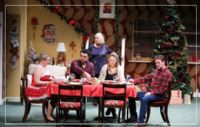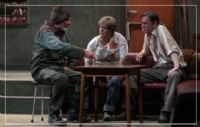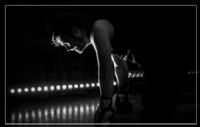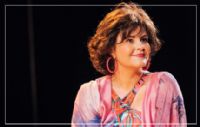Review: The Threepenny Opera
Date: 26/02/2018
Theatre Review
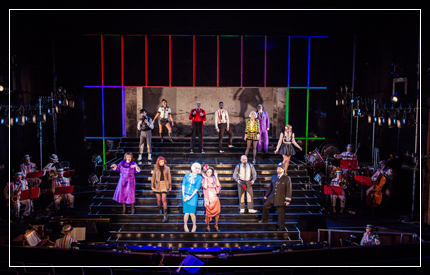
Bertolt Brecht and Kurt Weill's The Threepenny Opera, adapted in English by Marc Blitzstein, is a mouthful. Strike that. It's multiple mouthfuls, sweet, sour, hot and cold tastes thrown into a Northern Irish and European stew of disparate theatrical devices and operatic voices, the sort of thing that Tim Burton would have concocted in his heyday.
Quite an undertaking, then, for NI Opera's artistic director Walter Sutcliffe, Belfast's Lyric Theatre and the who's who of NI theatre talent in the cast.
What they give us, in the end, is very Tim Burton after all - a collection of well-conceived, exceptionally crafted and smartly performed ideas hampered, if not hamstrung, by overall tone, structure and pacing. A bit like Beetlejuice, where, interestingly, three was also a magic number.
Even the band, all dressed up for period effect, is split into three. The conductor and pianist are in a pit, with brass and string players resting either side of a staggering set. Black panels, hidden backdrops, a trapdoor and frighteningly steep looking stairs dominate Dorota Karolczak's otherwise colourful collection of concepts and costumes – the darkness of death, the colour of life and the drama in between all encapsulated in one giant spectrum of colour and design.
The arresting Kerri Quinn then makes her entrance as Jenny Diver, leading the cast into a sound rendition of "Mack The Knife" that appropriately sets the scene for the turbulent travails of Jenny's ex-lover Macheath (Mark Dugdale, suitably sleazy yet surprisingly pitable), and the two women in his life, Polly Peachum (Jayne Wisener) and Lucy Brown (Brigid Shine).
The initial focus on Polly's desire to marry Macheath, and vice versa (right?) and the opposition both face from Polly's parents Jonathan (a regal and commanding Stephen Page) and Celia (a dragged-up, fleetingly hilarious Matthew Cavan), broadens into a darkly comic tale of selfishness, exploitation and individual entitlement, in a town where "people have a capacity to turn their feelings on and off".
You gather that no one is to be trusted or taken remotely seriously in The Threepenny Opera. That it does not reflect the essence of character but the effects of capitalism. To me, it is telling that Jonathan Peachum is made up like a waxwork in tracksuit: is he so much a character as a mannequin, strictly in servitude of what his status demands and the choices others make? Such a point-of-view presents, beneath the song, dance and laughs, a melodramatic and rather tragic freak show, featuring background pantomime - performed rather well, it must be said, by Orla Mullan, Tommy Wallace, Jolene O’Hara, Paul Garrett, Richard Croxford, Maeve Smyth and Gerard McCabe - to go with the main course of the singers.
The trouble is that the panto sometimes upstages the singing, leading to unfortunate tonal lapses.
Fortunately, Jayne Wisener and Brigid Shine are on top of their game. Wisener's physical flexibility and creepily knowing gestures starkly contradict her deceptively delicate vocals, creating neither a green finch nor a linnet bird (with apologies to Wisener's role in another Tim Burton film) but an animated fly-off-the-wallflower who won't be messed with, a show-stopping presence. Shine is equally animated, her prime passion really shining (sorry) when she opens her mouth and belts out a tune. Kerri Quinn, alas, is underused; Jenny amounts to little more than the middle woman on this stage, a rock caught in a very hard place.
Any uneasiness probably boils down to personal preferences. I feel that Brecht and Weill are at odds with the fluidity and humanity I fully embrace in theatre. Credit Sutcliffe, then, for grasping what the material demands, and managing to deliver something memorable out of it all, though The Threepenny Opera's overall flow remains as uneasy as walking down those steep stairs must surely be.
Simon Fallaha
The Threepenny Opera runs at Belfast's Lyric Theatre until Saturday February 10.
Quite an undertaking, then, for NI Opera's artistic director Walter Sutcliffe, Belfast's Lyric Theatre and the who's who of NI theatre talent in the cast.
What they give us, in the end, is very Tim Burton after all - a collection of well-conceived, exceptionally crafted and smartly performed ideas hampered, if not hamstrung, by overall tone, structure and pacing. A bit like Beetlejuice, where, interestingly, three was also a magic number.
Even the band, all dressed up for period effect, is split into three. The conductor and pianist are in a pit, with brass and string players resting either side of a staggering set. Black panels, hidden backdrops, a trapdoor and frighteningly steep looking stairs dominate Dorota Karolczak's otherwise colourful collection of concepts and costumes – the darkness of death, the colour of life and the drama in between all encapsulated in one giant spectrum of colour and design.
The arresting Kerri Quinn then makes her entrance as Jenny Diver, leading the cast into a sound rendition of "Mack The Knife" that appropriately sets the scene for the turbulent travails of Jenny's ex-lover Macheath (Mark Dugdale, suitably sleazy yet surprisingly pitable), and the two women in his life, Polly Peachum (Jayne Wisener) and Lucy Brown (Brigid Shine).
The initial focus on Polly's desire to marry Macheath, and vice versa (right?) and the opposition both face from Polly's parents Jonathan (a regal and commanding Stephen Page) and Celia (a dragged-up, fleetingly hilarious Matthew Cavan), broadens into a darkly comic tale of selfishness, exploitation and individual entitlement, in a town where "people have a capacity to turn their feelings on and off".
You gather that no one is to be trusted or taken remotely seriously in The Threepenny Opera. That it does not reflect the essence of character but the effects of capitalism. To me, it is telling that Jonathan Peachum is made up like a waxwork in tracksuit: is he so much a character as a mannequin, strictly in servitude of what his status demands and the choices others make? Such a point-of-view presents, beneath the song, dance and laughs, a melodramatic and rather tragic freak show, featuring background pantomime - performed rather well, it must be said, by Orla Mullan, Tommy Wallace, Jolene O’Hara, Paul Garrett, Richard Croxford, Maeve Smyth and Gerard McCabe - to go with the main course of the singers.
The trouble is that the panto sometimes upstages the singing, leading to unfortunate tonal lapses.
Fortunately, Jayne Wisener and Brigid Shine are on top of their game. Wisener's physical flexibility and creepily knowing gestures starkly contradict her deceptively delicate vocals, creating neither a green finch nor a linnet bird (with apologies to Wisener's role in another Tim Burton film) but an animated fly-off-the-wallflower who won't be messed with, a show-stopping presence. Shine is equally animated, her prime passion really shining (sorry) when she opens her mouth and belts out a tune. Kerri Quinn, alas, is underused; Jenny amounts to little more than the middle woman on this stage, a rock caught in a very hard place.
Any uneasiness probably boils down to personal preferences. I feel that Brecht and Weill are at odds with the fluidity and humanity I fully embrace in theatre. Credit Sutcliffe, then, for grasping what the material demands, and managing to deliver something memorable out of it all, though The Threepenny Opera's overall flow remains as uneasy as walking down those steep stairs must surely be.
Simon Fallaha
The Threepenny Opera runs at Belfast's Lyric Theatre until Saturday February 10.



























